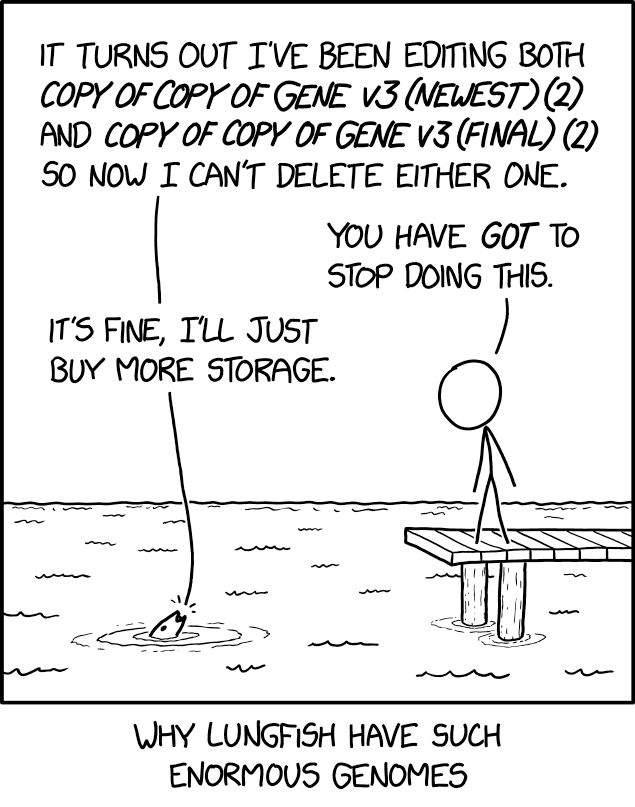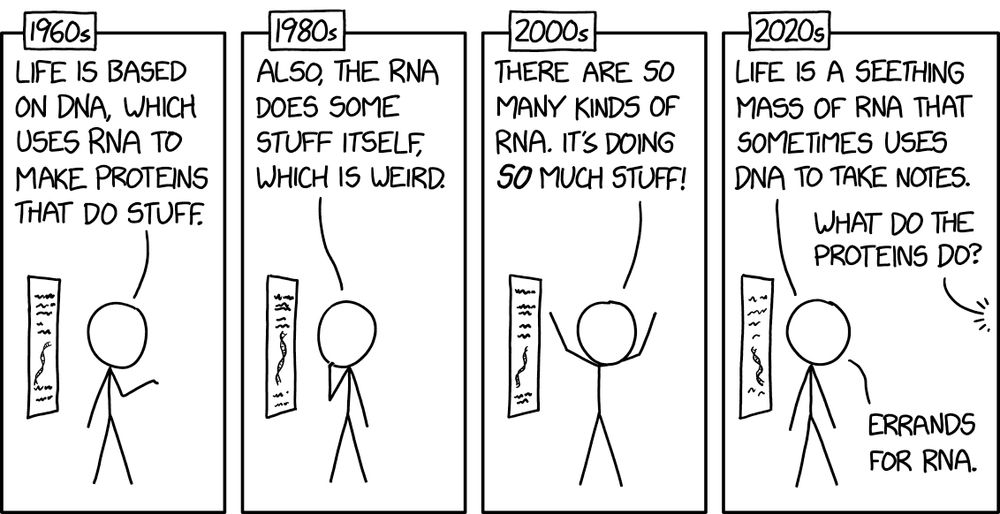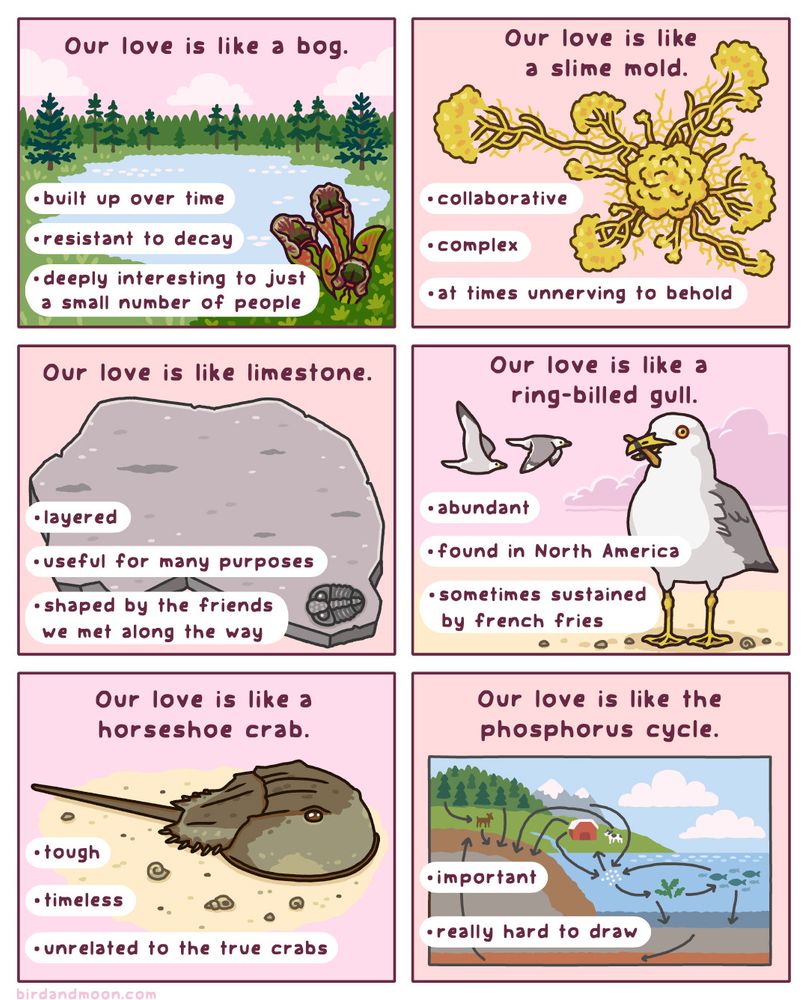
Lungfish xkcd.com/3064
17.03.2025 16:53 — 👍 11971 🔁 1316 💬 97 📌 88@katieleap.bsky.social
Biostatistician infiltrating molecular biology | PhD in uterus | why menstruation | how endometriosis | 🇺🇸 in 🇫🇷

Lungfish xkcd.com/3064
17.03.2025 16:53 — 👍 11971 🔁 1316 💬 97 📌 88
Science, research & public health face unprecedented attacks in the U.S.
We stand with our American colleagues & support the Stand Up for Science call.
Join the global march tomorrow, incl. in Paris! 🧪✊
📍 March 7, 13:30 – Place Jussieu
🔗 More info: standupforscience.fr
#StandUpForScience

A figure showing a human, pig, rat, and sheep uterus. The vagina, cervix, uterine body, uterine fundus, uterine horns, and fallopian tubes/oviducts are given specific colors so that the structures can be identified in the different species despite their different shapes. The human uterus has a simplex shape with the fundus at the top, body below, followed by a short cervix and a longer vagina. The pig uterus has two uterine horns that wind back on themselves, a fundus with a fold, a uterine body that joins the horns before leading into a very long cervix, and some vagina shown. The rat uterus has two thin straight uterine horns, with a fundus with a fold and a uterine body connecting the two horns. The cervix is short and the vagina is shown to be short as well. The sheep uterus has two uterine horns that are shown at an angle to the uterine body and are relatively short and squat. The uterine body is long, with a more flat fundus than the pig or rat. The cervix is the shortest of all four with a large and long vagina shown. Text at the bottom labels the species with the volume of the uterus estimated as follows: human: ~34 mL. Pig: ~620 mL. Rat: ~0.4 mL. Sheep: ~56 mL. Finally, the change in volume during pregnancy is given as follows: human: 200x. Pig: 35x. Rat: 175x. Sheep: 120x.
But the truth is that mammals all have exactly two ovaries! Pigs use two ovaries for their 7-14 piglets and it’s the uterine body that needs to adapt to fit them all. www.frontiersin.org/files/Articl...
05.03.2025 21:13 — 👍 7 🔁 1 💬 1 📌 0
A child’s drawing of a pig uterus in blue pen. There are six fallopian tubes and six ovaries attached to a single uterine body.

A child’s drawing of a pig uterus in pencil. There are ten fallopian tubes attached to ten ovaries. The uterine body is large like a balloon.

A child’s color pencil drawing of a pig uterus with fourteen fallopian tubes and fourteen attached ovaries. The uterine body is round like a beach ball with a triangle of endometrium seen within. A heart is drawn above from a previous prompt and a stick figure horse below for unknown reasons.
A little 🧪 break from doomscrolling:
Last month I asked a room full of 12 year olds to imagine what a pig’s uterus might look like. They were given a diagram of a human uterus and told to draw a pig uterus, thinking about how litter size might affect the shape. They all chose so many ovaries.

RNA xkcd.com/3056
26.02.2025 14:58 — 👍 17911 🔁 2570 💬 155 📌 171
A group of six nature valentines. A picture of a bog with pitcher plants, with text saying "Our love is like a bog. Built up over time, resistant to decay, deeply interesting to just a small number of people." A yellow slime mold stretching out and exploring. "our love is like a slime mold. Collaborative, complex, at times unnerving to behold." A piece of limestone with a small trilobite in the corner. "Our love is like limestone. Layered, useful for many purposes, shaped by the friends we met along the way." A ring-billed gull with a french fry on a beach. "Our love is like a ring-billed gull. Abundant, found in North America, sometimes sustained by french fries." An Atlantic horseshoe crab walking on the sand. "Our love is like a horseshoe crab. Tough, timeless, unrelated to true crabs." A drawing of the phosphorus cycle, with arrows connecting various parts of a scene, including algae and fish and a farm and a river and a forest. "Our love is like the phosphorus cycle. Important, really hard to draw."
Nature valentines.
Thanks to my Patrons for keeping me drawing www.patreon.com/birdandmoon

@clavergne-anth.bsky.social presented their work at ALPHY-AIEM, asking the hard questions: did the evolution of mensuration associate with diversifications in immune genes, to fulfill their new functions in the uterine cycle?
04.02.2025 15:38 — 👍 9 🔁 1 💬 1 📌 1Our first foray into the evolution of the mammalian uterus, spearheaded by Axelle Brulport, Malgorzata Gazda and @eulalieliorzou.bsky.social !
Some highlights below...
www.biorxiv.org/content/10.1...
(A first version was submitted during my maternity leave, this is a new and updated version!)
Hi Erik, I think genetics fits in other biology. My ORCID is here: orcid.org/0000-0002-62... I’d love to be added to the science feed, to spread the science of uterine function!
23.01.2025 22:04 — 👍 1 🔁 0 💬 0 📌 0I never know what to put in a first post, so how about a fun fact:
Did you know that the pig uterus has two horns that are each about a meter (3 ft) long?